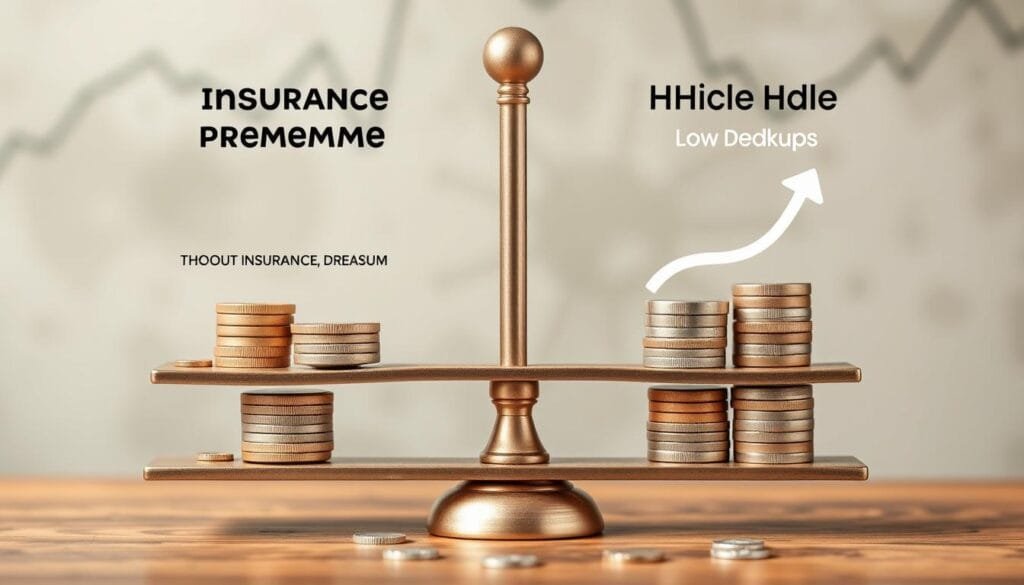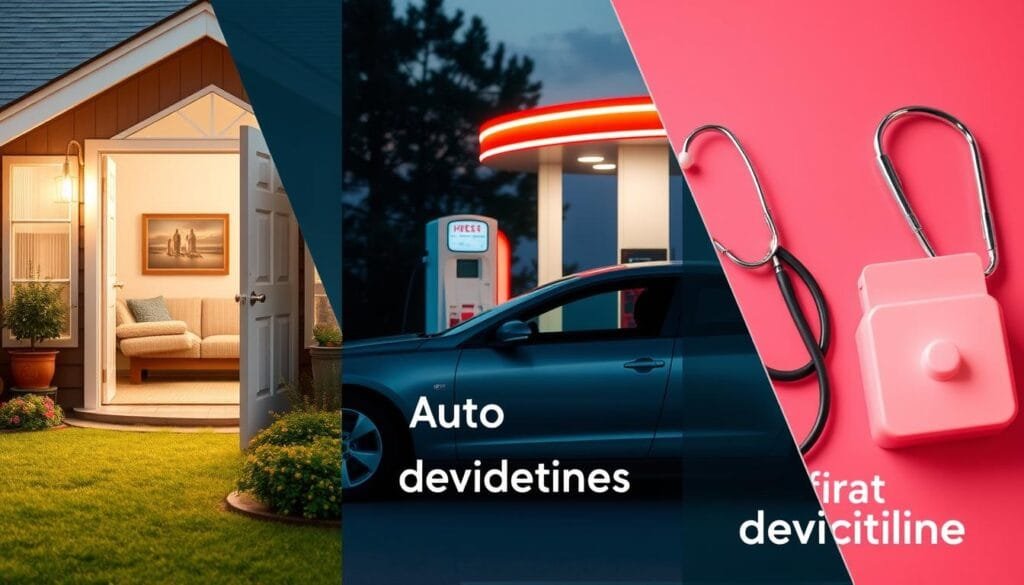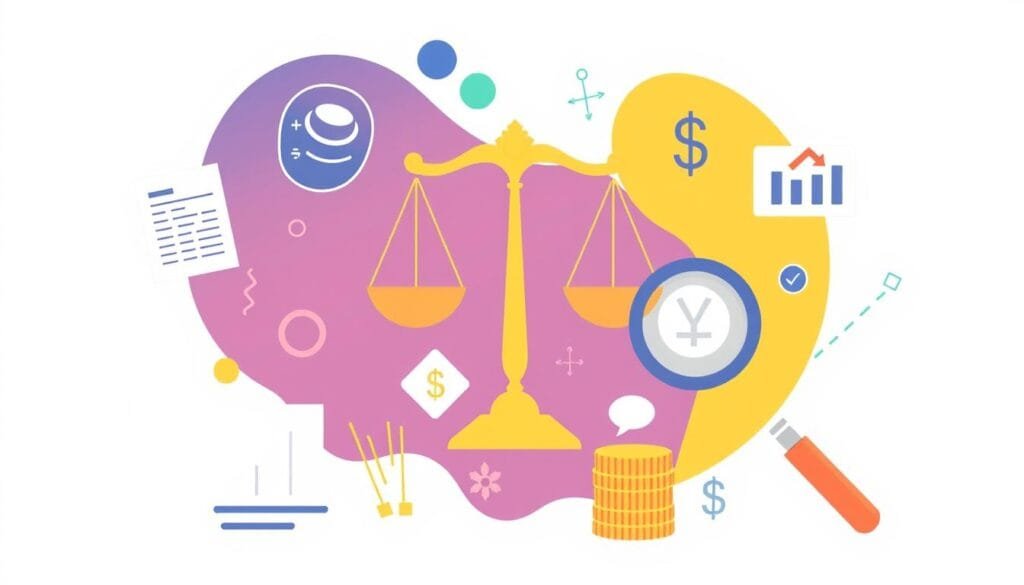לדעת על הפקדונות בביטוח חיוני אם ברצונך לנהל מדיניות ביטוחים בצורה טובה. הפקדונות הם הסכום שתשלם לפני שהביטוח שלך יעזור לך. הבנתם עוזרת בתכנון הכספים שלך, במיוחד במצבי חירום.
ללמוד על הפקדונות שונים והשפעתם על עלויות ותביעות היא חשובה. הידע הזה מאפשר לך לבחור את הביטוח הטוב ביותר עבור חייך והתקציב שלך.
מסקנות מרכזיות
- הפקדונות בביטוח הם העלויות האישיות של המבוטחים חייבים לכסות לפני שהביטוח מתחיל לשלם.
- הבנת הפקדונות בביטוח חיונית לקבלת החלטות מושכלות על אפשרויות הכיסוי.
- הפקדונות עשויים להשתנות בין מדיניות ביטוח שונות, כולל ביטוח רכב, בעלי בתים ובריאות.
- סכום הפקדון שלך עשוי להשפיע על השכר החודשי שלך; בדרך כלל, פקדונות גבוהים מביאים לשכר נמוך.
- חשוב לשקול את המצב הכלכלי שלך וסובלנות הסיכון שלך
בעת בחירת עצירה.
מהו עצירת ביטוח?
עצירת ביטוח היא מרכזית במדיניות רבות. חשוב להבין את ההגדרה ואת המטרה שלה למי שמתעמקים בעומקן של ביטוח. ההגדרה של עצירת ביטוח מציגה את הסכום שתשלמו לפני שהביטוח יכסה טענה. העלות הזו עוזרת לנהל סיכונים ולהוריד טענות קטנות. זה מכריח את בעלי הפוליסה לחשוב היטב על החלטות הביטוח שלהם.
הגדרה ומטרה
המטרה של עצירות היא לחלק את הסיכון בין הביטחון והמבוטח. זה מכריח את בעלי הפוליסה לשלם חלק מהעלות. זה יוריד את הטענות הקטנות וישמור על פרמיות זולות. זה מביא לבחירות חכמות, יוצר עולם ביטוח יציב. כאשר משהו קורה, העצירה היא מה שאתם משלמים תחילה לפני שמקבלים עזרת ביטוח.
סוגי מדיניות ביטוח עם עצירות
ישנם סוגים שונים של ביטוח עם עצירות
עשוי להופיע לך:
- ביטוח רכב: לרוב יש בפוליסת הרכב ערבות עבור נזקים וגניבות. לדוגמה, בחירת ערבות של 500 דולר אומרת שתצטרך לשלם את ה-500 דולר הראשונים בתיקון לאחר תאונה.
- ביטוח בעלי בתים: בעלי בתים רגילים נהגים לקבוע ערבות עבור דרישות נזקים. אלו יכולים להשתנות, לעיתים תלוי בין 500 ל-2% מערך הבית, על פי הפוליסה.
- ביטוח בריאות: רבים מתוכניות הבריאות מחייבות עמידה בערבות שנתית לפני שהתוכנית מכסה עלויות רפואיות. הסכומים שונים באופן רחב בין תוכניות שונות.
הבנת ערבויות ביטוח
לדעת כיצד ערבויות ודמי ביטוח עובדים ביחד היא מרכזית להחלטות ביטוח חכמות. נחקור כיצד בחירת רמת הערבות שלך משפיעה על מה שאתה משלם ועל יתרונות וחסרונות של ערבויות גבוהות לעומת נמוכות. בחירת הערבות הנכונה יכולה להשפיע מאוד על מדי נוחותך בעלויות ובכיסוי הביטוח שלך.
כיצד פריסות מובילות משפיעות על השכר הביטוח שלך
זה פשוט: פריסה גבוהה משמעה שבדרך כלל אתה משלם פחות בכל חודש עבור הביטוח שלך. חברות ביטוח רואות את אלה עם פריסות גבוהות כפחות סבירים להגיש הרבה תביעות. זה עשוי להוריד את הסיכון עבור חברות הביטוח. מצד שני, בחירת פריסה נמוכה משמעה כי כנראה תשלם יותר בכל חודש, מאחר שיש סיכוי גבוה יותר שתגיש תביעה. הבנת האיזון הזה עוזרת לך לבחור את התוכנית הטובה ביותר עבור התקציב והצרכים שלך.
פריסות גבוהות נגד פריסות נמוכות: יתרונות וחסרונות
חשוב להשוות בקפידה את יתרונות וחסרונות של פריסות גבוהות לעומת פריסות נמוכות. הנה סקירה מהירה של כל אפשרות:
| סוג החיסכון | יתרונות | חסרונות |
|---|---|---|
| החיסכון הגבוה |
|
|
| החיסכון הנמוך |
|
|

איך פריטי ריבית עובדים בתרחישים שונים
לדעת איך פריטי ריבית עובדים היא מרכזית כאשר מבוצעת בדיקת ביטוח. לכל סוג ביטוח יש כללי פריטי ריבית משלו שמשפיעים על מה שאתה משלם. נבחן פריטי ריבית עבור בעלי בתים, רכב וביטוח בריאות.
פריטי ריבית בביטוח בעלי בתים
פריטי ריבית בביטוח בעלי בתים נעים בין $500 ל- $2,500. הסכום שנבחר משפיע על הכיסוי שלך ותלוי בגורמי הסיכון של הבית שלך. אם אתה טוען נזקים, כמו לדוגמה אש או גניבה, אתה משלם את הפריטי ריבית תחילה. לדוגמה, עם נזק של $10,000 ופריטי ריבית של $1,000, הביטוח משלם $9,000.
פריטי ריבית בביטוח רכב
פריטי ריבית בביטוח רכב משתנים, עם סכומים נפוצים היות והם $250, $500, או $1,000. הפריטי ריבית משפיעים על עלויות הפרמיום שלך; בחירת פריטי ריבית נמוכה יותר מביאה לפרמיום גבוה יותר וההפך. לאחר תאונה או גניבה, אתה משלם את הפריטי ריבית לפני שהביטוח מכסה את השאר. הבחירה הזו משפיעה על האם להגיש תביעה ועל עלות המדיניות בכללה.
החזרי ביטוח בריאות
החזרי ביטוח בריאות הם מורכבים, לעיתים קרובות עם רמות שונות. HDHPs דורשים לשלם בין 1,400 דולר ל-7,000 דולר מהכיס תחילה. לאחר הגעת לסכום ההחזר, הביטוח מכסה חלק גדול יותר מהוצאות הרפואה. הבנת החזרי ביטוח בריאות אלו חיונית לניהול הוצאות בריאות.

| סוג ביטוח | טווח פונד העצמה טיפולי | השפעה על דרישות |
|---|---|---|
| ביטוח בעלי בתים | $500 – $2,500 | חייבים לשלם לפני שהכיסוי נכנס לתוקף |
| ביטוח רכב | $250 – $1,000 | הפרש העצמה משפיע על החלטות בדרישות |
| ביטוח בריאות | $1,400 – $7,000 (עבור HDHPs) | ניהול עלות לשירותי רפואה |
גורמים המשפיעים על סכום העצירה
הבנת מה שמשפיע על סכום העצירה היא מרכזית לאסטרטגיית הביטוח שלך. גורמים כמו הנוחות שלך עם הסיכון, הכיסוי ביטוח שתבחר, וההיסטוריה של התביעות שלך חשובים. הם עוזרים להחליט על סכום העצירה שלך.
טולרנס סיכון שלך
כמה סיכון אתה מוכן לקחת משפיע על בחירת העצירה שלך. אם אתה מעדיף שלא להוציא הרבה על תביעות, ייתכן ותרצה עצירה נמוכה. אבל אם אתה בסדר עם הסיכון, עצירה גבוהה עשויה להיות בחירתך. זה עשוי להוריד את השכר הביטוח שלך.
אפשרויות כיסוי ביטוח
מדיניות ביטוח שונה עשויה לשנות את סכום העצירה. יותר כיסוי או גבולות גבוהים בדרך כלל משמעותם עצירות גבוהות יותר. המדיניות מותאמת בגמישות, מאפשרת לך לבחור מה שעובד עבור התקציב והצרכים שלך.
תדירות והיסטוריית תביעות
ההיסטוריה של התביעות שלך חשובה גם. אם אתה מגיש תביעות בתדירות, חברות הביטוח עשויות לבקש עצירה גבוהה יותר. אבל אם אתה מגיש תביעות בנדיבות, ייתכן ותקבל צער עצירה טוב יותר. זה מכיוון שחברות הביטוח רואות אותך כפחות סוכן.

מסקנה
פריסות ביטוח משחקות תפקיד חשוב באופן שבו הביטוח עובד עבור כולם. מאמר זה הדגיש למה פריסות חשובות. הן משפיעות על השכר הביטוח שלך, על האפשרויות שיש לך, ועל אופן ניהול הכסף שלך. בחירת הפריסה הנכונה דורשת חשיבה. זה יכול לחסוך לך כסף או לגרום להוצאות נוספות. לכן, חשיבה על הסיכונים שלך והמצב שלך היא מרכזית.
ביטוחים כמו בית, רכב או בריאות כל אחד מהם יש לו כללי פריסה משלו. ראינו כיצד הבחירות הללו משפיעות על הארנק שלך. לדעת על בחירות הפריסה שלך יכול להפוך את הביטוח שלך ליותר יעיל עבורך. זה גם עוזר לשמור על עלויות נמוכות.
חכם לבדוק את תוכניות הביטוח שלך עם המידע הזה בראש. שינוי בפריסה עשוי להפוך את התשלום על הביטוח לקל או למנוע חשבונות בלתי צפויים. זכור, זה לא רק על חיסכון בכסף. זה גם על הבטחה שאתה מוגן כאשר דברים בלתי צפויים קורים.


















